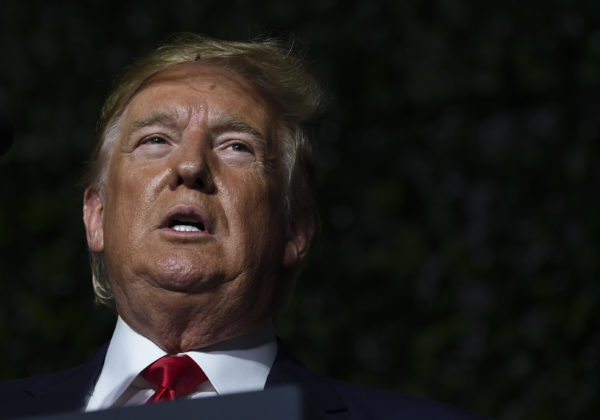Despite what FBI Director Christopher A. Wray said about how focused the agency is on domestic terrorism, two former government officials say there is fear over pursuing the matter — and one says panic is based on President Donald Trump and his base.

In a statement that Wray issued Sunday night following the two mass shootings at a Walmart in El Paso, Texas, and Ned Peppers bar in Dayton, Ohio, the former of which federal authorities said they’re treating as an act of domestic terrorism after shooter Patrick Crusius had a manifesto that contained racist rhetoric, he assured that the agency “will bring the full resources of the FBI to bear in the pursuit of justice for the victims of these crimes.”
The statement followed his remarks during a congressional hearing late last month where Wray said, “We, the FBI, don’t investigate ideology, no matter how repugnant,” adding, “when it turns to violence, we’re all over it.”
According to statistics obtained by the Washington Post, there were around 100 domestic terrorism suspects arrested between October 2018 and June 2019. Should the trend keep going, the total number of arrests for this year would be greater than last year’s. In 2018, there were around 120 arrests for suspected domestic terrorists. In 2017, that number sat at about close to 150.
Despite what Wray said, Dave Gomez, a former FBI supervisor who oversaw terrorism cases, told the newspaper he believes FBI officials are leery of seriously going after white nationalists because of the politics surrounding it — namely the followers of Trump.
“I believe Christopher A. Wray is an honorable man, but I think in many ways the FBI is hamstrung in trying to investigate the white supremacist movement like the old FBI would,” he said. “There’s some reluctance among agents to bring forth an investigation that targets what the president perceives as his base. It’s a no-win situation for the FBI agent or supervisor.”
Gomez noted that part of the hesitation comes, in part, from Trump’s public criticism of the FBI in connection to the probe into his conduct during Russia’s meddling in the 2016 presidential election.
“I don’t think there’s any faith by the FBI right now that the Justice Department is an independent law enforcement organization,” stated Gomez. “I think the FBI is up to the challenge of investigating white nationalism and white supremacy as a domestic terrorism threat, they just have to be allowed to do it.”
However, his speculations were denied by an FBI spokesman. He said the agency allocates resources to match its determination that domestic terrorists are a steadfast threat to the country. Additionally, the spokesman shut down the notion that a lack of trust is brewing between his agency and the DOJ; he said the two agencies work jointly. The FBI is under the umbrella of the federal law enforcement agencies controlled by the Department of Justice.
According to him, the FBI “remains concerned that U.S.-based domestic violent extremists could become inspired by these and previous high-profile attacks to engage in similar acts of violence.”
Yet Gomez is not alone in his belief that all is not being done to subdue threats of domestic terrorism.
Daryl Johnson, a former analyst for the Department of Homeland Security who caused a political firestorm a decade ago over a memo that warned about an increasing threat of domestic terrorism, said elected officials have been fearful about tackling the problem.
“Here we are 10 years later, this threat is still alive and well and in some respects is actually growing. It’s very concerning,” he said. “I’m still in disbelief that the federal government response seems to be lacking. People that we elect seem to lack political willpower to tackle this issue and call it out and do something about it.”
He also said that the government has lessened grant programs for fighting such violence when they actually should be increasing them.
He told the publication, “We’re in this heightened state of activity where we have mass shootings and bomb plots, and yet there’s no political willpower and everybody seems to be burying their head in the sand rather than try to tackle the issue.”


